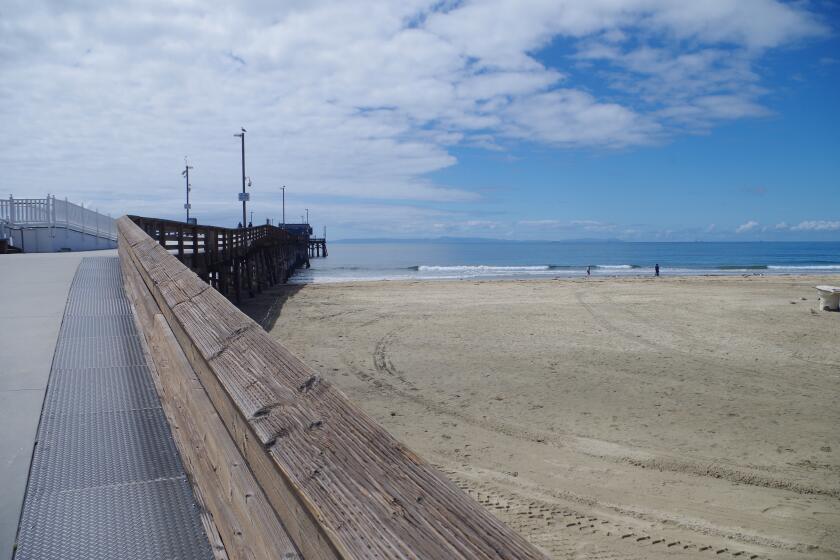Having the system wired
- Share via
HUMBERTO CASPA
While sending money back home is common with every ethnic group, it
has become an issue closely associated with the Latino population and
in Costa Mesa is part of a growing piece of the local economy.
“I send about $500 a month to Mexico,” Miguel Arredondo said.
“Most of that money pays a real estate investment.”
Arredondo manages and owns part of Jugos Acapulco, a small Mexican
shop of soft drinks located on 19th street, right across from the
DMV.
Another woman, who has lived in the community more than 10 years,
tells me that she wires an average of $300. “The money,” she says,
“helps pay her daughter’s college tuition and subsidizes her living
expenses.”
Her daughter attends a small, private nursing school in La Paz,
Bolivia.
Wiring money is often a monthly affair for local residents who
have left behind a close relative in their native country.
According to the Pew Hispanic Center, a research foundation on
Latino issues in Washington, D.C., the money sent from the United
States to other countries goes to subsidize basic needs, such as
food, electricity and shelter, as well as education.
Some people, however, wire money to take care of a business
abroad. And there are those individuals like Munoz who, unlike
Arredondo and others, have no extra money to support anybody in their
country of origin.
“I care about my dad and mom, as well as my husband’s relatives,”
Munoz said. “But after paying a rapacious rent and other monthly
bills, we hardly have enough to spend on our own family.”
Munoz works as editor at a tabloid magazine in Santa Ana. She and
her husband rent a two-bedroom apartment near Orange Coast College.
They moved to Costa Mesa three years ago.
The reasons people send money home are many, but one of them
stands out.
Reports show out of the $160 billion leaving the U.S., more than
$30 billion settles in Latin America. Mexico alone received about $14
billion in 2004. In addition, it is estimated that one-tenth of
Nicaragua and El Salvador’s total output comes from U.S. remittances.
Striking figure.
Like some areas in Orange County, Costa Mesa has also been pushed
in to the money-wiring process.
Our small but increasingly profitable Latino market has turned
into an attractive economic field for wiring companies seeking better
pastures. As usual, Western Union has played a major role in
dictating the market in this business.
Nonetheless, other tough competitors, such as Sigue and Unigram,
have already come in and seem adamant about not bailing out. At least
that’s what I heard from a manager of Sigue. Meanwhile, Mexico
Express, Vigo and Giromex might also be on the verge of following in
the footsteps of the other companies. Who knows what’s going to
happen next?
The wiring business in Costa Mesa runs smoothly, said Rodolfo
Monreal, manager and owner of a wiring-transfer service located
inside a video store on Harbor Boulevard.
He estimates 90% of the people using his shop send money to
Mexico. The rest splits between El Salvador and Guatemala. I asked
him how the business was going. He answered, “Right now it’s slow,
but in general it’s fine.”
Moreover, it is clear that those on the recipient side benefit the
most from the wiring process, as researchers at the Pew Hispanic
Center pointed out.
Also, people involved in the business, from the “little” guy down
in the small booth to the “big” fellow working at his/her corporate
office, get the lion’s share. It provides them jobs. The state and
sometimes local governments, such as Costa Mesa, may also collect
dividends from taxes.
Needless to say about the market, it kicks overused hard currency
off the system, allowing new breeds of cash to settle in the market.
In some ways, it is a natural way to dissipate signs of inflation. No
wonder government authorities say little about this trend.
On the negative end, though, wiring money, among other things,
could drive immigration up.
Juani Funez-Gonzalez, professor of social sciences at OCC,
explained: “Relatives could be using it as a stepping stone to
getting to the United States.”
When I see the results of this business in our community,
especially when I talk to the people involved in it, the positive
outcomes seem to outweigh the negative consequences.
In the end, it appears that everyone touched by the wiring process
has a reason to celebrate.
Some usual senders may sigh in relief when the money reaches its
destiny. Their efforts here pay off there. It is likely that their
families too will find those dollars handy to buy their daily needs.
Nice end to a tedious process.
* HUMBERTO CASPA is a Costa Mesa resident and bilingual writer. He
can be reached by e-mail at [email protected].
All the latest on Orange County from Orange County.
Get our free TimesOC newsletter.
You may occasionally receive promotional content from the Daily Pilot.



